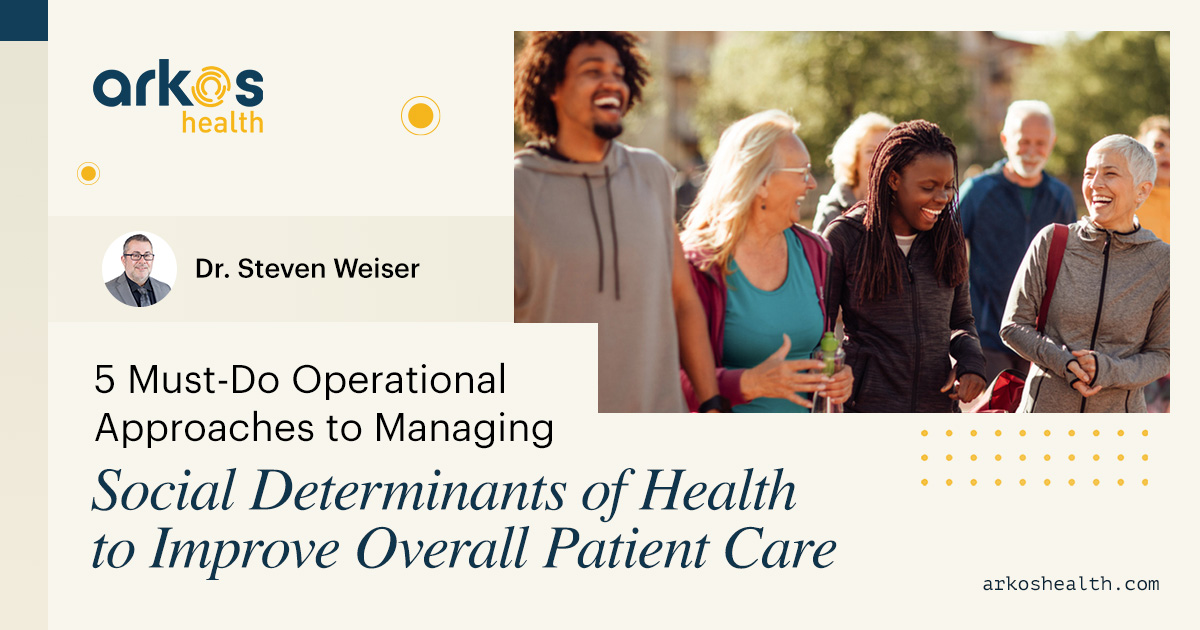
In the ever-evolving landscape of healthcare, addressing social determinants of health (SDOH) has increasingly become a priority to improve patient outcomes. Arkos Health, a leader in innovative healthcare solutions, emphasizes that a holistic approach to patient care and effective strategies begins with focusing on the conditions in which people are born, live, work, and age. Here are five must-do operational approaches to managing SDOH:
1. Comprehensive Assessment and Data Collection
One of the foundational steps in addressing SDOH is comprehensive assessment and data collection. Healthcare providers need to systematically gather detailed information about patients’ social, economic, and environmental conditions. By utilizing standardized screening tools during patient interactions, healthcare providers can accurately assess various SDOH components such as housing stability, food security, and employment status. This data is crucial for creating individualized care plans that consider the broader context of a patient’s life.
2. Collaboration with Community Organizations
The complexities of SDOH require a collaborative approach that extends beyond the confines of traditional healthcare settings. Partnering with community organizations, such as housing authorities, food banks, and employment agencies, can create a robust support network for patients. These collaborations help ensure that patients have access to necessary resources and services, thereby addressing external factors that may hinder their health outcomes.
ARKOS Health emphasizes building strong community ties to seamlessly integrate health interventions with social support systems. “Building strong collaborations with community organizations is essential,” states Dr. Steven Weiser, Market President of North Dakota at Arkos Health. “Our partnerships with local non-profits and community centers enable us to connect patients with essential resources. By working closely with these entities, we ensure that they receive the support needed beyond clinical care.”
3. Integrating Technology and Health Information Systems
Leveraging technology is essential for managing and addressing SDOH effectively. By integrating electronic health records with social data, healthcare providers can gain a comprehensive view of patients’ needs and design targeted strategies. Technological tools can identify risk patterns and alert healthcare providers to potential interventions, making the care process more efficient and proactive. This integration also facilitates better communication and coordination between different stakeholders involved in patient care.
4. Patient-Centric Care Models
Focusing on patient-centric care ensures that healthcare strategies are aligned with individual needs and preferences. “At Arkos Health, we prioritize listening to our patients,” explains Dr. Steven Weiser. “This approach helps us develop personalized care plans that address both medical and social factors, leading to better health outcomes.” By involving patients in the planning process, healthcare providers can empower individuals to take an active role in their health journey. Personalized care plans not only improve health outcomes but also enhance patient satisfaction and engagement.
5. Training and Educating Healthcare Providers
Healthcare professionals need to be well-equipped to identify and respond to SDOH. Arkos places a strong emphasis on continuous education and training programs that enhance the awareness and skills of healthcare providers. This includes educating staff about the impact of SDOH on health, cultural competence, and the available resources for addressing these challenges. By investing in training, healthcare providers are better prepared to advocate for patients and tailor interventions that reflect the unique needs of everyone.
By adopting these five operational approaches, Arkos Health aims to create a healthcare environment where social determinants are actively managed, fostering better overall patient care. As the healthcare industry continues to evolve, addressing these determinants remains an imperative task for improving patient outcomes and ensuring equitable access to health services. To learn more, visit Arkos Health.
BY Steven Weiser
Published April 17, 2025 3:49PM


